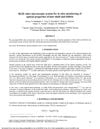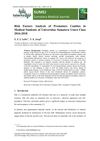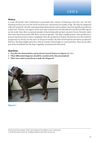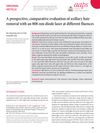 1 citations,
January 2010 in “Elsevier eBooks”
1 citations,
January 2010 in “Elsevier eBooks” Any drug can cause skin reactions, but antibiotics, NSAIDs, and psychotropic drugs are more common, with some reactions being life-threatening.
 1 citations,
November 2008
1 citations,
November 2008 Yonnyuniksoogobon-dan taken orally promotes hair growth by affecting growth factors in hair roots.
 1 citations,
March 2004 in “Journal of The European Academy of Dermatology and Venereology”
1 citations,
March 2004 in “Journal of The European Academy of Dermatology and Venereology” Hair loss improved with treatment and successful transplant.
 1 citations,
May 2001 in “Proceedings of SPIE, the International Society for Optical Engineering/Proceedings of SPIE”
1 citations,
May 2001 in “Proceedings of SPIE, the International Society for Optical Engineering/Proceedings of SPIE” The system helps monitor hair properties using RGB video microscopy.
 1 citations,
February 1993 in “Nursing Standard”
1 citations,
February 1993 in “Nursing Standard” Many drugs, not just chemotherapy, can cause reversible hair loss.
 1 citations,
January 1980 in “Archives of Dermatology”
1 citations,
January 1980 in “Archives of Dermatology” Syphilis chancres can be atypical, and fiber implantation for baldness is risky and often fails.
 June 2024 in “Frontiers in pharmacology”
June 2024 in “Frontiers in pharmacology” 2-deoxy-D-ribose gel may help regrow hair in cases of hair loss.

Ayurvedic herbs may reduce side effects and improve effectiveness of cancer treatments.
 February 2024 in “bioRxiv (Cold Spring Harbor Laboratory)”
February 2024 in “bioRxiv (Cold Spring Harbor Laboratory)” Tandem repeats significantly influence hair color, especially darker shades, across different ancestries.
 January 2024 in “GeroScience”
January 2024 in “GeroScience” Using radiation to make mice's hair turn gray helps study and find ways to prevent or reverse hair graying.
 December 2023 in “International Journal For Multidisciplinary Research”
December 2023 in “International Journal For Multidisciplinary Research” Indian medicinal plants can help with hair growth and common hair issues.
 October 2023 in “bioRxiv (Cold Spring Harbor Laboratory)”
October 2023 in “bioRxiv (Cold Spring Harbor Laboratory)” Early regulatory T cells are crucial for normal skin pigmentation.
 September 2023 in “Asian journal of beauty & cosmetology”
September 2023 in “Asian journal of beauty & cosmetology” Lipids are important for healthy hair, but their exact role is not fully understood and needs more research.
 September 2023 in “Journal of movement disorders”
September 2023 in “Journal of movement disorders” Dopaminergic therapy in Parkinson's disease patients is linked to increased hair loss.
 June 2023 in “International journal of research in ayurveda and pharmacy”
June 2023 in “International journal of research in ayurveda and pharmacy” Dhatryadi Rasayana, an Ayurvedic herbal mix, may be a safe and effective way to prevent premature hair greying.
 June 2023 in “NILES Journal forGeriatric and Gerontology/NILES Journal for Geriatric and Gerontology”
June 2023 in “NILES Journal forGeriatric and Gerontology/NILES Journal for Geriatric and Gerontology” Oral tranexamic acid is a safe and effective treatment for melasma.
 January 2023 in “Postępy Dermatologii i Alergologii”
January 2023 in “Postępy Dermatologii i Alergologii” Azelaic acid treats acne, rosacea, and hyperpigmentation with minimal side effects.
 April 2021 in “The journal of investigative dermatology/Journal of investigative dermatology”
April 2021 in “The journal of investigative dermatology/Journal of investigative dermatology” The anti-hair loss shampoo effectively promotes hair growth and improves hair quality.
 January 2020 in “Sumatera Medical Journal”
January 2020 in “Sumatera Medical Journal” Family history and stress are linked to early hair graying, with family history being the main factor.

Innate lymphoid cells type 1 may contribute to alopecia areata by damaging hair follicles.

The document concludes that non-endocrine alopecia in pets varies in treatment effectiveness and often has a poor prognosis, especially in cats.

Premature greying of hair affects the social lives of medical students but not their self-esteem.
 May 2019 in “Small Animal Dermatology”
May 2019 in “Small Animal Dermatology” The dog has Color Dilution Alopecia, causing hair loss and increased risk of skin infections.
 April 2019 in “Archives of aesthetic plastic surgery”
April 2019 in “Archives of aesthetic plastic surgery” Higher fluences in 808-nm diode laser treatments are more effective for axillary hair removal.
 April 2018 in “Journal of Investigative Dermatology”
April 2018 in “Journal of Investigative Dermatology” Macrophages are more involved in Lichen planopilaris than in Frontal fibrosing alopecia.
 April 2018 in “Journal of Investigative Dermatology”
April 2018 in “Journal of Investigative Dermatology” The conclusion is that the cornea has two types of stem cells, with Lrig1+ cells being key for renewal in aging corneas, independent of CD44.
 April 2018 in “Journal of Investigative Dermatology”
April 2018 in “Journal of Investigative Dermatology” Different types of stem cells in the skin contribute to the variety of melanoma forms.
 December 2017 in “Springer eBooks”
December 2017 in “Springer eBooks” Transplant patients often get skin problems, with treatments varying by condition.

Proper care and diet are crucial to prevent health issues in gerbils.
 June 2017 in “Experimental and Therapeutic Medicine”
June 2017 in “Experimental and Therapeutic Medicine” The anti-CXCL4 antibody helps mice grow hair faster and prevents hair loss.






























